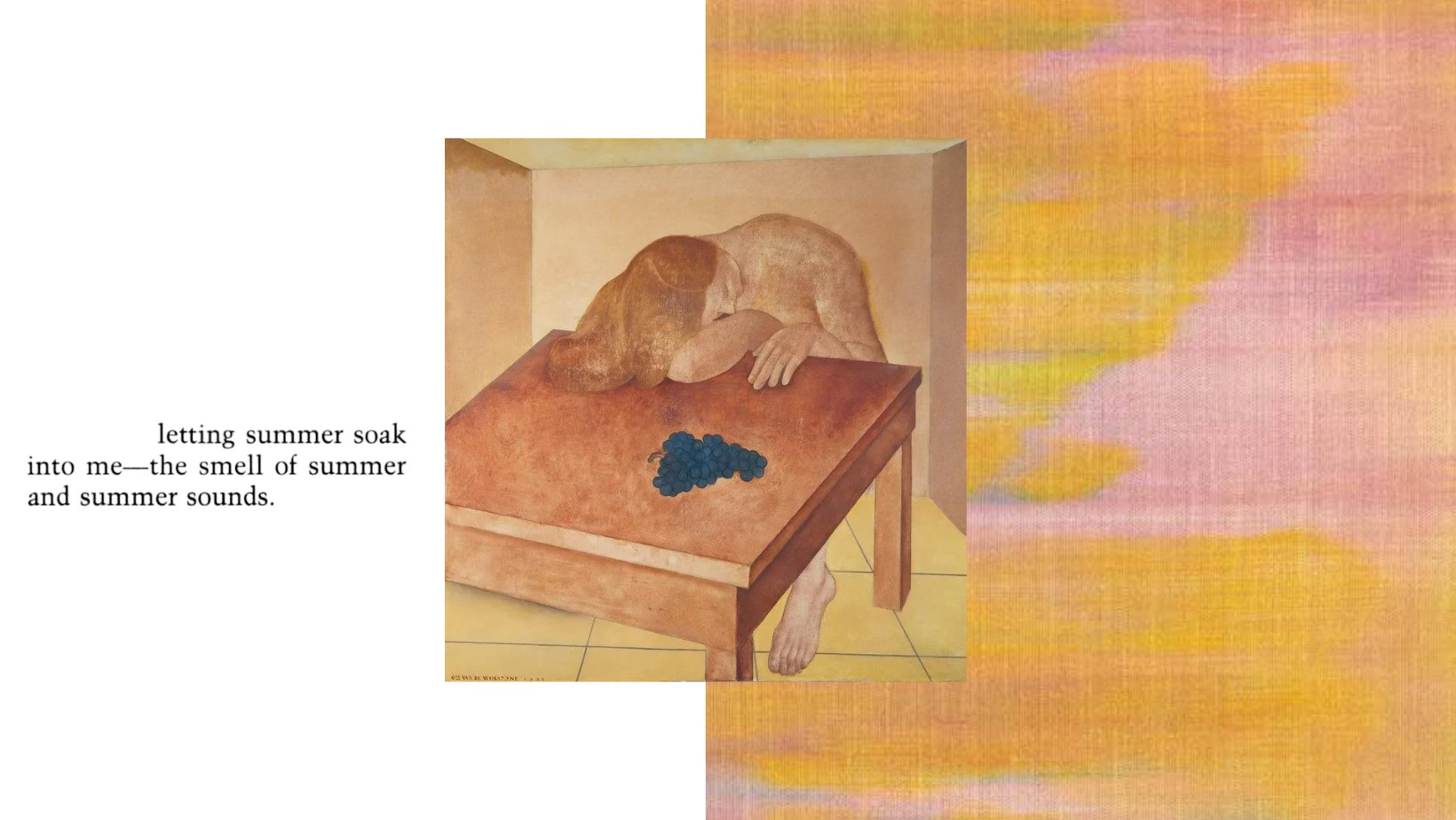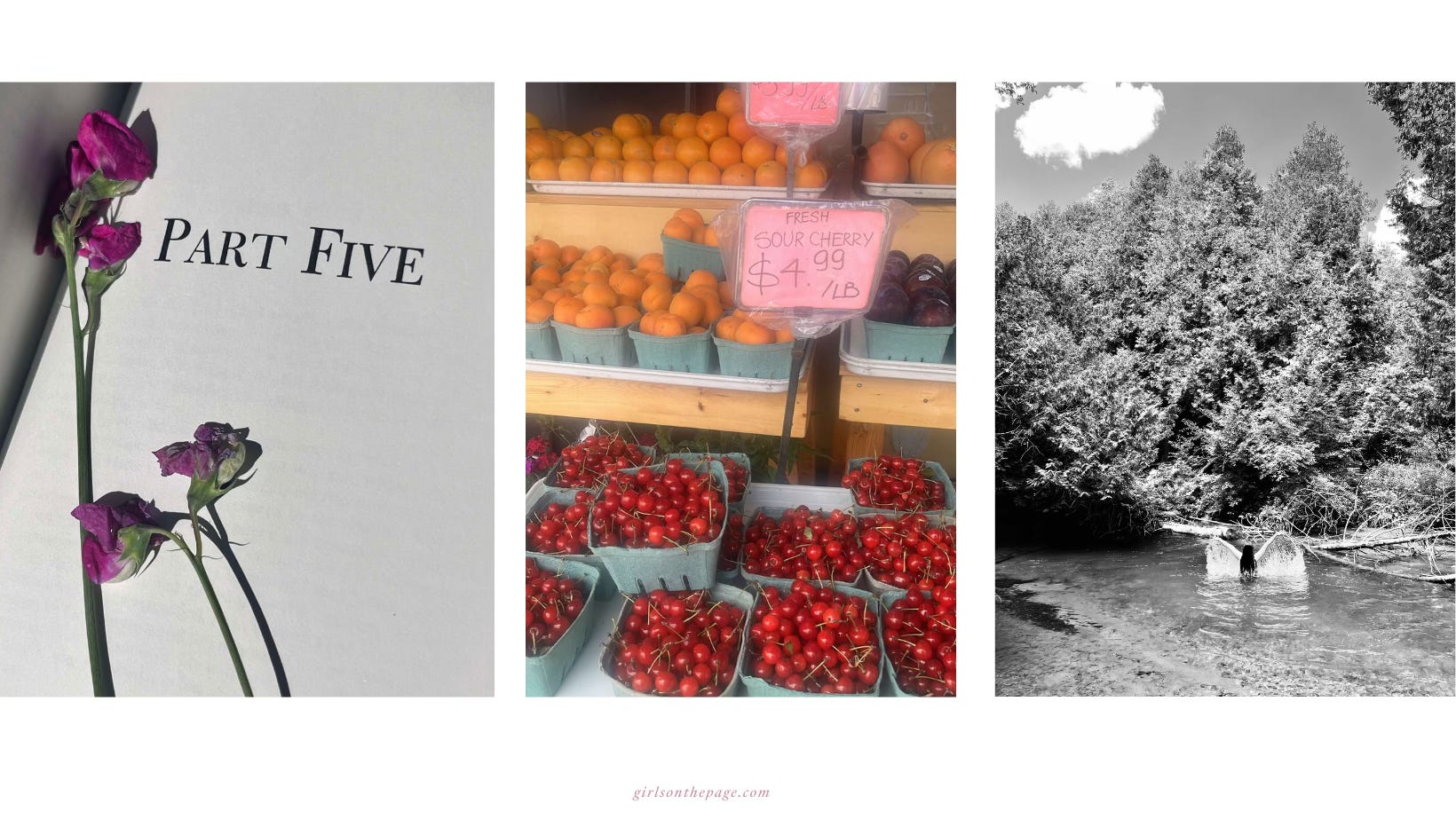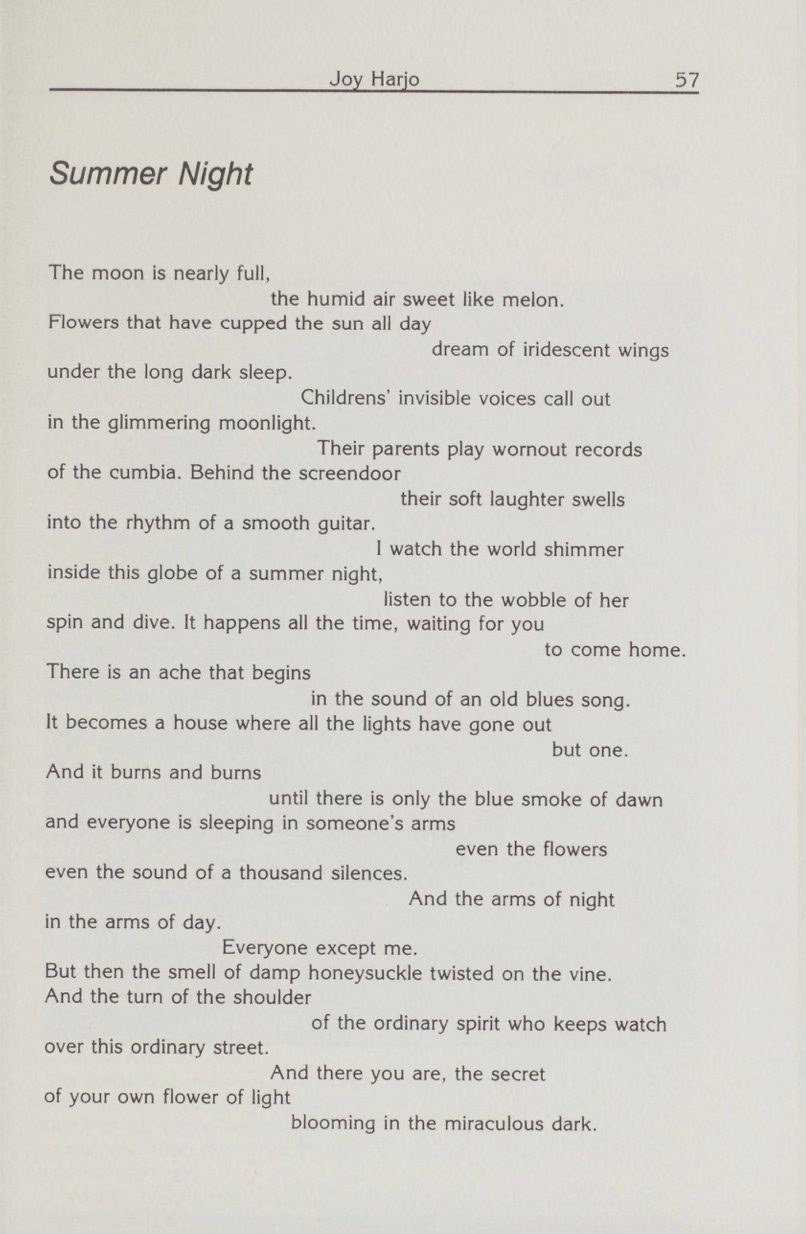A summer spell
Stepping into the dream world with Edith Wharton, Joy Harjo & Louise Glück
We’ve entered the bracket of summer where dates slip, Mondays and Tuesdays gone. You reach for numbers—the date, the time—and they aren’t there. I’ve been wanting to lean into this feeling more: letting hours slide by, telling time by the sun. In summer everything is measured in flowers and fruit, what’s in season:
Tiger lilies, smoke bush, sweet peas, squash blossom, cherries, peaches, watermelon. Lately every meal I make consists of some combination of corn, asparagus, summer squash and redcurrant.
The plants in my balcony garden—marigolds, basil, oregano, tomato—have their own agenda, replenishing each time my back is turned, multiplying after storms. Summer advances on its own terms: I want to watch it, revel in this sea of green before inevitably, the first yellow begins to show. Before things get sunburnt. Before I become used to the season. Before we reach the middle.

Someone recommended that I read Summer by Edith Wharton—“it can’t be read in winter or spring,” they said. “Only summer.” I had a feeling. It’s been on my shelf since February, a birthday present from my fiancé. Certain books are meant for certain seasons. Published in 1917, the novel is short—around 150 pages—and follows young Charity Royall through a New England summer as finds her footing in the world, navigating treacherous relationships while discovering her own sense of self. Wharton captures the season in all its glory: “She was blind and insensible to many things, and dimly knew it; but to all that was light and air, perfume and colour, every drop of blood in her responded. She loved the roughness of the dry mountain grass under her palms, the smell of the thyme into which she crushed her face, the fingering of the wind in her hair and through her cotton blouse, and the creak of the larches as they swayed to it. She often climbed up the hill and lay there alone for the mere pleasure of feeling the wind and of rubbing her cheeks in the grass. Generally at such times she did not think of anything but lay immersed in an inarticulate well-being.”
During an afternoon at the lake my copy tumbled off the rocks, into the water. The pages are now undulant as the waves they fell into (it took two days for them to dry). I can barely see the pencil-underlined passages anymore, but I like that—in future, whenever I see Summer’s warped profile, I’ll remember that day at the beach.
When I think of what makes summer summer, I find that I am always looking backwards: the quiet country roads from where I grew up, windows open and curtains stirring in the night breeze, the event of a car passing once, maybe twice an hour. Real silence. Bare feet on soft grass. Bare feet on a gravel driveway. Plunging into the river, a burst of sunlight through clenched eyes. The dragonflies. The hills. Sunsets like spun sugar, scrambling up a ladder to the roof to watch them. The sporadic green light from fireflies, cupping them in my fist. Somehow, even if I’m not there, this place in memory, I can feel it on my skin in the summer. I can at least conjure it.
The final lines from Louise Glück’s ‘Aubade’ repeat in my head:
There was one summer returning over and over / there was one dawn / I grew old watching.
By mid-month it felt like I was living in a house of mirrors, the walls closing in. Weeks of oppressive humidity, heatwave after heatwave, too hot to venture out when the sun was at its strongest. The air conditioner was working overtime; struggling against the humidity, fuses blew every other day. I found myself irritated by the lengths made to keep rooms cool, Uber drivers who protested that the air conditioning was on when I needed to roll a window down to catch a breeze. I was sick of looking at things through glass, looking at but not touching. I wanted to feel summer. That Timothy Leary slogan kept coming to mind—Tune in, turn on, drop out. Only instead of LSD, I was imagining it as a motto for spending less time indoors, less time online. Housebound in the heat, stir crazy from sitting in the same room all day, spending any amount of time in front of a phone or computer screen inspired an intense physical reaction, like I was wearing an outfit that was on fire, and needed to disrobe immediately. Being on my phone felt wrong, akin to meditating to a machine. I wanted boredom, the kind that was experienced as a kid in the summer, before the Internet, before everything and everyone was a click away, always available.
In Brick #105, Erin Wunker wrote about “the kind of boredom in which afternoons are eternal”:
When I try to recall the boredom and aimlessness of childhood, I find mostly hazy memories hovering on the horizons of my synapses: the feeling of sun through an open window, the fug of ancient blankets spread over chairs to make a fort. Cicadas. Grass drying in the heat. June bugs hitting the screen. What is it about expansive time and summer? No school, probably. Though surely I was bored at other times, it was always summer boredom that was visceral. Underwater time. Mornings on a screened-in porch, the ancient Naugahyde glider creaking as I tap my foot. Afternoons spent swimming swimming swimming. Evenings that stretch past dinner, the hum of mosquitos thickening as the sun fades. Almost always I am alone in these memories. There is never television. There are often books, which I have finished, and the feeling of almost-sleep or near-frustration. As I enter my fortieth year, I find myself recalling these moments more and more. This is not nostalgia. It is something else. I think it has to do with time.
Each year this sentence from Martha Gellhorn comes to mind: “I wait every year for summer, and it is usually good, but it is never as good as that summer I am always waiting for.”
In the past I’ve shared the same sentiment—the best summer has already happened, or else it hasn’t happened yet. But that’s dangerous thinking. What about this year? Why not craft yourself a dream world?
Months ago I took a screenshot of a quote from a Margaret Drabble story, from the collection A Day in the Life of a Smiling Woman: Complete Short Stories. I loved the writing, but I also saved it as a projection of what my dream summer might look like—
I want to gaze at a view that has not changed much in a thousand years. I want a deep, healing peace to possess me. I want to sip gin and wander through long grasses. And so I’ve made it my summer mission to set out for these moments, create them myself.
I’ve spent the week with my Mom, in the small town close to where I grew up. The hours melt into feeling, impression. This seems to be a hallmark of summer: In a 1973 essay for the New York Times, Toni Morrison keeps time on a summer day via the dishes her family makes: “The day moved then into its splendid parts: a ham, fried-potatoes, scrambled-egg, breakfast in the morning air; fried fish and pan-cooked biscuits on the hind side of noon . . . We were all there, All of us, bound by something we could not name. Cooking, honey, cooking under the stars.”
The sun travels through each room, offering spots to read in. We collect sweet peas and tiger lilies from the roadside, spend an hour dividing them into bouquets, choosing which vase will house them. Swim in the river, swim in the lake, splash and float and sing. I turn down streets I’ve never been down, get high on the low-stakes terror of still being able to get lost. There are rabbits on lawns. Kids on bikes toting fishing poles. My fingertips, stained blue from berries. Every other photo on my phone, blurred from a filter of sunscreen. I walk, the sun on my back, sweat on my temples, feeling my body cut through the fog of velvet humidity. I sink into these moments, knowing that before long, they’ll be memory.
This is your invitation to turn your body to the door, step outside. Soon July will fade into August, and August into September. The middle of summer is the best time to get lost, to lean into the disorientation of the season. Read as you would eat a slice of cake—slowly, joyously, perhaps in the company of loved ones, or better yet, alone in the sun. Go for a long walk, bring a baggie of cherries with you, pop them like candy. Orchestrate the strange severance of a summer day: turn down streets whose names you don’t recognize. Lose the hour, don’t look at your phone, except to take a picture that might transport you back to this moment, come the chill of January. Take pleasure in the season, feel it deeply. Sweat. Swim. Gaze at a view that has not changed much in a thousand years. Let this be the summer you’ve been waiting for.











"When I think of what makes summer summer, I find that I am always looking backwards." I feel this SO deeply and have found myself in a similar place lately– resisting this idea that the best summers have already happened and deciding instead to make it (and fill it) with what I want. Which is usually the most simple and accessible things– the reading, the stonefruit, the getting lost.
This is some of your best work! Thank you for sharing that piece on boredom from Brick too! And a friend of mine has been telling me for years to read Edith Wharton and I…. just haven’t yet. So maybe this is the push I needed:)